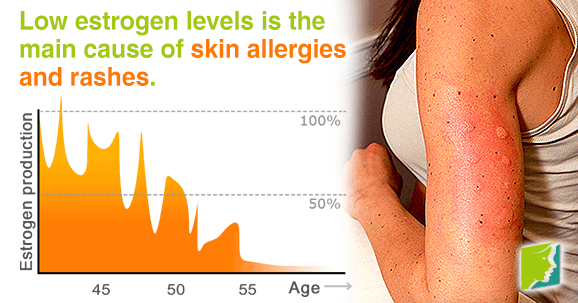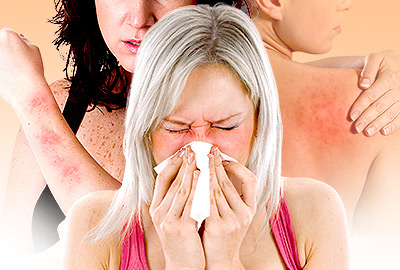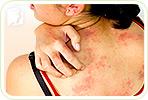Along with a host of other symptoms, skin allergies and rashes can be experienced during menopause. The symptom can often be annoying, distressing, and embarrassing. The hormone shifts responsible can sometimes result in a women's skin becoming drier and more susceptible to itchiness and rashes.

What Happens to the Skin?
During menopause, women might notice a drastic change in their skin condition. The transition can see it becoming dry and itchy, and the woman might find herself suffering from newfound allergies or reactions to things with which she had no problems previously.These changes can often cause flakiness, scaling, and rashes, which can all vary in severity.
What Causes Skin Allergies and Rashes?
Menopause involves a drop in the levels of estrogen, which is the main cause for the onset of skin allergies and rashes during the transition. The reason for this is that estrogen has an important role to play in maintaining healthy skin. Throughout the years prior to menopause, this hormone regulates the secretion of oils and helps keep the skin from becoming damaged. However, a loss of estrogen during menopause means less skin collagen, less oil secretion, and less resilience to the outside world.
What Are the Symptoms?
Women can experience this menopause symptom in several different ways. Some women report that their elbows and face are the first place they notice signs of skin allergies and rashes, whereas for others, it might be the limbs, chest, or back. Women might also experience:
- Small bumps on the skin surface
- Red or irritated skin
- Skin rash
- Dry skin
How Do I Deal with it?
Skin allergies and rashes during menopause can often be managed through the implementation of a few self-care and natural remedies.
Eat plenty of omega-3 fatty acids. These fats will promote moisturized and supple skin. This nutrient can be found in foods like salmon, walnuts, fortified eggs, flaxseed, and soy. Alternatively, most health food stores sell omega-3 supplements.
Drink plenty of water. This is the best way to keep your skin moisturized and will help prevent drying and flaking.
Make sure your showers aren't too hot. Too much hot water on skin will lead to drying and sensitivity. Keep your showers short and use warm water rather than
Moisturize after showers. This can be done using a moisturizer or oil. Some people find they start becoming sensitive to their body lotions during menopause, so if this happens, try a different brand or use an oil such as coconut oil to moisturize with.
Use gentle, non-irritating soaps. Again, many women develop skin allergies to certain soaps, so use the gentlest ones you can find, making sure they are fragrance-free.
Skin allergies and rashes during menopause are often a natural consequence of the decline in levels of estrogen. By identifying your triggers and making a few lifestyle changes, the effects of your new skin allergies and rashes should become drastically reduced.
Sources
- National Institutes of Health. (2012). Aging changes in skin. Retrieved December 10, 2014, from http://www.nlm.nih.gov/medlineplus/ency/article/004014.htm
- National Institutes of Health. (2012). Dry skin. Retrieved December 10, 2014, from http://www.nlm.nih.gov/medlineplus/ency/article/003250.htm
- Office on Women's Health. (2008). Skin and Hair Health. In: The Healthy Woman: A Complete Guide for All Ages. pp. 305-316



